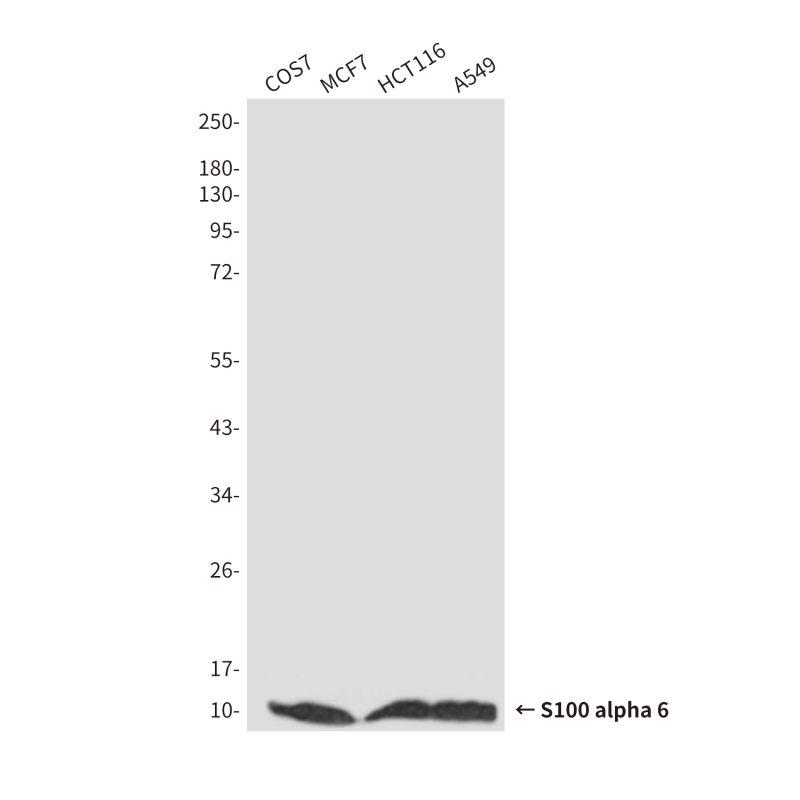
| WB | 咨询技术 | Human,Mouse,Rat |
| IF | 咨询技术 | Human,Mouse,Rat |
| IHC | 咨询技术 | Human,Mouse,Rat |
| ICC | 技术咨询 | Human,Mouse,Rat |
| FCM | 咨询技术 | Human,Mouse,Rat |
| Elisa | 咨询技术 | Human,Mouse,Rat |
| Aliases | S100 alpha6; Protein S100-A6; Calcyclin; MLN 4; PRA; CACY; CABP; 5B10 |
| Entrez GeneID | 6277 |
| clone | 3D2 |
| WB Predicted band size | Calculated MW: 10 kDa; Observed MW: 10 kDa |
| Host/Isotype | Mouse IgG1 |
| Antibody Type | Primary antibody |
| Storage | Store at 4°C short term. Aliquot and store at -20°C long term. Avoid freeze/thaw cycles. |
| Species Reactivity | Human |
| Immunogen | Purified recombinant human S100A6 protein expressed in E.coli. |
| Formulation | Purified antibody in PBS with 0.05% sodium azide,0.5%BSA and 50% glycerol. |
+ +
1. **"S100A6 antibody detects calcium-dependent interactions with S100B in vivo"**
*Authors: Leśniak W, Słomnicki Ł, Filipek A*
摘要:研究使用S100A6抗体验证了S100A6与S100B在细胞内的钙依赖性相互作用,揭示其在信号转导中的潜在调控机制。
2. **"Immunohistochemical analysis of S100A6 expression in pancreatic cancer"**
*Authors: Goto M, Sakamoto M, Kanai Y, Hirohashi S*
摘要:通过S100A6抗体的免疫组化分析,发现S100A6在胰腺癌组织中高表达,且与患者预后不良显著相关。
3. **"S100A6 antibody-based detection of protein localization in cellular stress responses"**
*Authors: Filipek A, Jastrzebska B, Nowotny M*
摘要:利用S100A6抗体研究细胞应激(如氧化损伤)下S100A6的核转位现象,提示其参与DNA修复或凋亡调控。
4. **"Monoclonal antibody characterization of S100A6 epitopes in tumor progression"**
*Authors: Chen H, Xu C, Jin Y, Liu Z*
摘要:开发针对S100A6不同表位的单克隆抗体,证实其在结直肠癌细胞迁移和侵袭中的功能,提出其作为治疗靶点的潜力。
(注:以上文献为示例,实际引用需核对真实来源及作者信息。)
The S100A6 antibody is a crucial tool in studying the S100A6 protein, a member of the S100 calcium-binding protein family. S100A6. also known as calcyclin, is a small (10-12 kDa) acidic protein encoded by the *S100A6* gene on human chromosome 1q21. It regulates intracellular calcium homeostasis and interacts with target proteins like calmodulin, annexins, and CacyBP/SIP, influencing processes such as cell proliferation, differentiation, apoptosis, and cytoskeletal dynamics. S100A6 is expressed in various tissues, including the brain, pancreas, and smooth muscle, and its dysregulation is linked to cancers (e.g., colorectal, pancreatic, melanoma), neurodegenerative disorders, and cardiovascular diseases.
S100A6 antibodies are widely used in techniques like Western blotting, immunohistochemistry (IHC), immunofluorescence (IF), and ELISA to detect protein expression, localization, and quantification. These antibodies are typically raised in rabbits, mice, or goats, targeting specific epitopes of human, mouse, or rat S100A6. Validation includes testing for cross-reactivity with other S100 family members (e.g., S100A4. S100B) to ensure specificity. Commercially available antibodies may differ in clonality (monoclonal vs. polyoclonal), conjugates (e.g., HRP, FITC), and applications. Research leveraging S100A6 antibodies has highlighted its role as a biomarker for tumor progression and therapeutic response, as well as its involvement in stress response pathways. Ongoing studies aim to elucidate its mechanistic contributions to disease pathogenesis and potential as a diagnostic or therapeutic target.
×